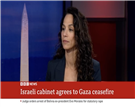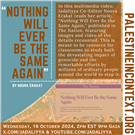[This is the first part of a six-part series associated with a Jadaliyya roundtable discussing targeted killings. Participants include Richard Falk, Nathan Freed Wessler, Pardiss Kabriaei, Leonard Small, and Lisa Hajjar.]
On 5 March 2012, Attorney General Eric Holder delivered a speech in which he laid out the US position on law and national security. The second half of his speech was devoted to the targeted killing program, which has escalated dramatically during the Obama administration. Although the military and Central Intelligence Agency (CIA) have been engaged in such attacks for years, rarely have government officials acknowledged the practice on the record. Holder stated that he could not "discuss or confirm any particular program or operation," but his speech was significant for publicly outlining the Obama administration`s position on the rationales under federal and international law. The most contentious issue, at least domestically, is the targeted killing of US citizens abroad. He defended the legality of such operations and, implicitly, the legality of excluding the courts from playing any oversight role. "`Due process` and `judicial process` are not one and the same," Holder said, "particularly when it comes to national security. The Constitution guarantees due process, not judicial process."
In this Jadaliyya Occupation, Intervention, and Law (O.I.L.) roundtable on targeted killings, Richard Falk, Nathan Freed Wessler, Pardiss Kabriaei, and Lennie Small engage with Lisa Hajjar’s “Lawfare and Targeted Killing: Developments in the Israeli and US Contexts.” They offer interventions that extend the discussion in a variety of directions, and she provides a response to their contributions.
Hajjar’s thought-provoking essay traces Israeli and US efforts over the last decade to establish the legality of the practice of targeted killing. She terms this “state lawfare,” which she defines as
"interpretative innovations … devised to frame otherwise clearly illegal practices as legal by contending that the laws that would prohibit them are inapplicable. In these twenty-first century asymmetrical conflicts, officials interpreted the law to assert the state’s operationally and territorially unbounded rights and the rightlessness of its enemies."
She also examines another aspect of state lawfare, namely efforts to challenge the legality of targeted killing policies in national courts in Israel, the United States, as well as several other countries.
Richard Falk, a world-renowned scholar of international law and politics who currently serves as the United Nations (UN) Special Rapporteur on the Human Rights Situation in the Occupied Palestinian Territories, highlights the impact of reciprocity in international law. He argues that the influence of US and Israeli arguments about the legality and legitimacy of targeted killings may embolden other states to follow suit, adopting the practice and asserting its legality. He warns that because the international community would probably respond to targeted killings by other regimes as terrorism, the current situation portends double standards similar to those which exist in relation to criminal accountability for gross crimes and the proliferation of nuclear weaponry. Falk also argues that the use of self-defense rationales by the United States to justify targeted killings in various countries has the potential to convert the whole world into a global battleground.
Nathan Freed Wessler, a staff attorney with the American Civil Liberties Union (ACLU), has also examined the US practice of targeted killings. He highlights the lack of transparency surrounding this policy and the pitfalls of shielding official decision-making and targeting criteria from both public scrutiny and judicial review. In response to legal challenges, the Obama administration has invoked the "states secrets" privilege to cloak itself in immunity, and has staunchly refused to respond to two Freedom of Information Act (FOIA) requests brought by the ACLU. Wessler concludes his argument by calling for a more transparent policy that may benefit from judicial review to limit the scope of executive authority in killing programs whose targets include US citizens.
Pardiss Kabriaei, a staff attorney for the Center for Constitutional Rights (CCR), explores US insistence on maintaining a secret program without review and warns of the dangers of deferring to executive assurances alone. Kabriaei illustrates the problems with this secretive, unaccountable governmental position by drawing comparatively on the deleterious experience of Guantanamo. She notes that the push by CCR and others for judicial review of Bush administration detention policies that violated US and international laws had a positive effect in curbing at least some abuses. The same, Kabriaei, could hold true for targeted killing. She cautions that “unreviewable executive authority can lead to overreaching and abuse regardless of the particular president in office and, in the context of targeted killing, the consequences are obviously irreparable."
Lennie Small, a PhD student, begins with his discussion with recent efforts to distinguish between “assassination,” which is clearly illegal, and “targeted killing,” which has become the preferred term for extra-judicial executions in the context of asymmetric wars. He takes issue with Hajjar’s analysis of “state lawfare” as a contemporary phenomenon. He argues that similar patterns of legal interpretation have been used for centuries by powerful governments to legitimate tactics of warfare and other forms of state-sanctioned violence to maintain control over rebellious populations or opposition groups. Small then describes and evaluates the role of military lawyers, specifically Israeli military lawyers, in the evolution of these concepts and their application in the current conflict in Israel/Palestine.
Lisa Hajjar responds to these contributions by reading them in relation to the March 5 speech by Eric Holder. She argues that Holder`s speech epitomizes what she characterizes as "state lawfare." His position—along with that of the Obama administration he represents—is a manifestation of what Falk terms the "imperial" or "hegemonic" force of international law. But, Hajjar argues that the kind of lawfare she favors, which Falk would call "constructive lawfare" as represented by the work of lawyers like Wessler and Kabriaei, is extremely important at this juncture, even if they (and lawyers like them) do not fully appreciate the long-term potential for litigation as a means of defending hard-fought values such as the right to life, due process, and the right not to be tortured. Ideally, if Falk`s optimistic interpretation is correct, we are entering into a period of much-needed national debate on the issue.
Jadaliyya Roundtable on Targeted Killings:
Part II: A Meditation on Reciprocity and Self-Defense in Relation to Targeted Killing
Part III: Lawyering and Targeted Killing
Part IV: The Need for Judicial Review of US Targeted Killing Practices
![[Reaper drone screen. Image from unknown archive.]](https://kms.jadaliyya.com/Images/357x383xo/reaperdronekellan.jpg)










